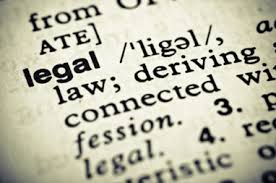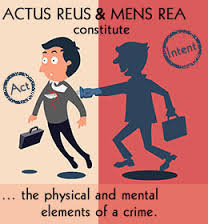Defenses and Due Process

Understanding Crime And Its Elements
Before discussing the courts and how they work, the defense and prosecution, sentencing, prison time, and appeals, crime and its elements have to be understood. For an act to be considered a crime, the act must include three elements. These elements are actus reus, mens rea, and concordance between the two. After an action is constituted as a crime, the person who committed the crime will go through the legal process of obtaining a lawyer, going to court and facing a judge, and facing any punishments handed down, whether it is jail time, prison time, or any fines. These punishments and this process must be fair. The founding fathers of this country made sure that if a person were accused of a crime, that he or she would have a fair trial; this is known as due process. One element of due process is “the government must provide you with an opportunity to rebut their charges against you in a meaningful way and at a meaningful time” ("Procedural due process,"). To rebut the charges against a person is to defend oneself. There are defenses that people use that prevent them from being held accountable for their criminal actions.

Actus Reus & Mens Rea
To constitute an action as a crime there must be actus reus, mens rea, and concordance between the two elements present. First, actus reus means that the actions of a person have to be a guilty act, a voluntary act, and the action must break a criminal statute. The statute has to be broken intentionally, a person that thinks about committing a crime but never acts on it, or a person that gets hit in the head by someone having a seizure resulting in injury, does not constitute as a crime. The second element of a crime is mens rea; this means “all crimes need a guilty sate of mind” (Meyer & Grant, 2003, P. 29). Overall, mens rea means that if a person did not intend to break the law they can not be held responsible. There are a few exceptions to this rule however, a person does not need to know that what they are doing is breaking the law, all he or she needs is to know what they are doing. For example, let’s say a person decides not to pay their taxes; they do not need to know that this is illegal; all they need is to make a conscious decision not to pay their taxes. The third element of crime is the concordance between actus reus, mens rea, and other issues. This means that all aspects have to be seen in order to constitute an act as a crime. All of the elements of a crime are referred to as corpus delicti which means body of a crime, in Latin. According to Meyer and Grant “there can be no crime unless a guilty action follows a guilty intent, and the two combine to produce criminal harm” (Meyer & Grant, 2003, P. 32), meaning that all elements of a crime have to be present.

Due Process
After an action is deemed a crime in the eyes of the law, the person who carried out the action will be given a chance to defend themselves in front of a jury of their peers. Again, this is known as due process. There are a few general legal defenses that defendants use in court to try and excuse their actions. These defenses are, infancy, insanity, intoxication, self-defense, prevention of a violent felony, coercion/duress, necessity, entrapment, syndromes, and mistake of fact. Taking a closer look at some of these defenses will give you an idea of some of the arguments inside of a courtroom. If a person pleads insanity for their defense, it means that at the time of incident the persons mental state could be considered insane and therefore “could not rationally form mens rea to commit a criminal act” (Meyer & Grant, 2003, P. 33). Another general legal defense is self-defense; this is when a person’s actions are meant to protect themselves. If a person is being attacked and they shoot their attacker and kill them, they may not be held accountable because they believed that their life was in danger and they were protecting themselves from serious bodily harm or even death. Another form of defense is entrapment, meaning that “government agents may not originate a criminal design, and then induce commission of the crime so that the government may prosecute” (“Entrapment-elements,”). A person might have hostel feelings towards a group of people and wishes they could do something about it, but holding them back is the ability to obtain resources. Let’s say a government agency finds out that this person wants to do something to hurt another group and offers to help this person without the person knowing that he or she is dealing with the government. If this happens and then the person is charged with a crime, his or her defense could be entrapment.
In The End
There are many steps involved in the criminal justice system. Defining the elements of a crime, due process, and legal defenses all play an important role in the big picture. First, crime has to be defined so that everyone knows what actions constitute as a crime. Once crime is defined, and one has been committed, due process is awarded to the criminal, meaning they have a right to a fair trial by their peers. During this trial, the accused will have the opportunity to use one of the general legal defenses and argue his or her case. Without the American justice system and due process, we the people would be at risk of being accused of a crime and thrown in jail or prison with no way of defending ourselves. There are cases that are failed by the justice system, but due process reduces the likelihood of this happening greatly.
What Do You Think?
Does the American justice system work, or should there be a complete overhaul?
Reference
Procedural due process . (n.d.). Retrieved from http://law2.umkc.edu/faculty/projects/ftrials/conlaw/proceduraldueprocess.html
Meyer, J. F., & Grant, D. R. (2003). The Courts in Our Criminal Justice System. Upper Saddle River, NJ: Prentice Hall.
Entrapment—elements. (n.d.). Retrieved from http://www.justice.gov/usao/eousa/foia_reading_room/usam/title9/crm00645.htm








